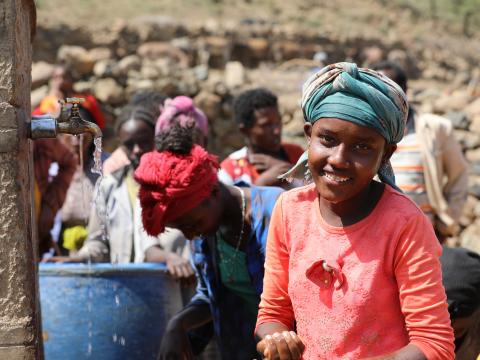Water - World Vision’s most precious gift to Alduba Community

While waiting to celebrate World Water Day on March 22, this piece of writing about the rural community at Jinka in Alduba District shows why water deserves celebration every day and needs to be given due respect.
When World Vision inaugurated a rural solar-powered water project at Alduba District, women –except a few of their representatives–, were nowhere in sight. This is because culture dictates women to be more responsible for feeding the family and to obtain and carry household water from a source located away from their homes; while men negotiate on important matters, restore peace and keep their community secure. When we visited, women were mostly scattered everywhere fetching water, farming, beekeeping, collecting firewood, or doing house chores.
The Alduba community is situated in arid land which is rich in natural resources with overproduction of natural forest, fruits, vegetables, and commercial crops like coffee, cardamom, and ginger. And yet, the community didn’t have a water source to satisfy its members' thirst. Women, girls, and even men would desperately wander to fetch water from a murky hole that they depended on for many years to meet their basic water, sanitation and hygiene (WASH) needs.
Zenebech Kenemsy, a mother of six and one of the women who attended the inauguration at Alduba said, “My only daughter and I are mainly responsible to satisfy the demanding needs of our family of eight. This is indeed a special gift for women and girls dwelling in this area, for we had suffered a great deal throughout our lives and for many years trying to get water to satisfy our thirst and feed our families.”
With vivid memory of the agonising days, Zenebech further narrates: “We were obliged to deal with difficulties of all kind: Our daughters have paid a lot of sacrifices; from waking up at dawn and traveling long distances, fighting with wandering street dogs, and at times being bitten by wild animals. We also used to frequently fall and break our legs and backbones as the landscape becomes difficult to walk on when it gets wet, and number of men, who offered to help the women, have also lost their lives.”
“We thank World Vision for understanding the dire needs of our community and choosing to intervene to address one of our very critical problems. We consider this as the most precious gift”, Zenebech adds, with a sigh of relief.

Opportunities for sustainable growth, which are commonly expected to occur as a result of improved access to safe drinking water, are not likely to occur unless the burden of the work of fetching water is recognised and reduced. The WASH programme at World Vision makes up one of the cornerstones of our national strategy for Ethiopia.
The programme principally aims to reach children and families with a holistic suite of WASH interventions, led by its mission - “Every child deserves safe water”.
Click here to learn more.